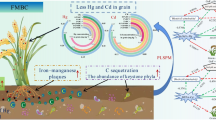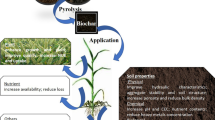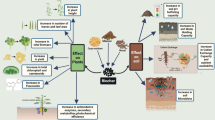Abstract
To test the hypothesis that by alleviating the salt stress in salt-affected soil, biochar could maintain crop yields even if fertilizer use is reduced by 25% in the Yellow River Delta (YRD). A field trial was conducted to assess the effect of biochar use alone (3, 6, and 12 t ha−1) and in combination with reduced fertilization (25% reduction) on alleviating salt stress, enhancing nutrient supply, and increasing crop yields in wheat–maize rotation. Porous biochar at 12 t ha−1 dose significantly decreased the bulk density of saline soil and increased its saturated hydraulic conductivity (Ks) and water content at wheat and maize harvest over the control (CK). Being rich in K+ (493.9 mmol kg−1), the biochar reduced sodium adsorption ratio (SAR) and Cl−/√SO42− at wheat harvest by 50% and 73%, respectively, and helped the uptake of K+ by crops over Na+, resulting in a higher K/Na ratio of grains in treatments as compared to the control. Similar trends were found when biochar (12 t ha−1) was applied together with 75% of conventional fertilization (CF: 375 kg ha−1). This combined biochar and fertilizers increased soil NH4+-N, Olsen-P, nutrient supply, and crop yields compared to 75% CF. Excessive Na+ and soil compaction limited crop yields in YRD. Biochar amendment reduced soil bulk density and increased saturated hydraulic conductivity (Ks). They, in turn, enhanced salt leaching and made salt compositions more favorable to crop growth. Compared with 75% CF, co-application of 6–12 t ha−1 biochar and 75% CF increased crop yields.






Similar content being viewed by others
Data Availability
Included in tables and figures, available on request.
References
Al-Wabel MI, Hussain Q, Usman ARA, Ahmad M, Abduljabbar A, Sallam AS, Ok YS (2018) Impact of biochar properties on soil conditions and agricultural sustainability: a review. Land Degrad Dev 29:2124–2161. https://doi.org/10.1002/ldr.2829
Baiamonte G, Crescimanno G, Parrino F, De Pasquale C (2019) Effect of biochar on the physical and structural properties of a sandy soil. Catena 175:294–303. https://doi.org/10.1016/j.catena.2018.12.019
Bao SD (2000) Soil agro-chemical analysis, 3rd edn. China Agricultural Press, Beijing, pp 187–196. (in Chinese)
Blanco-Canqui H (2017) Biochar and soil physical properties. Soil Sci Soc Am J 81:687–711. https://doi.org/10.2136/sssaj2017.01.0017
Burrell LD, Zehetner F, Rampazzo N, Wimmer B, Soja G (2016) Long-term effects of biochar on soil physical properties. Geoderma 282:96–102. https://doi.org/10.1016/j.geoderma.2016.07.019
Chaganti VN, Crohn DM, Šimůnek J (2015) Leaching and reclamation of a biochar and compost amended saline–sodic soil with moderate SAR reclaimed water. Agric Water Manage 158:255–265. https://doi.org/10.1016/j.agwat.2015.05.016
Chakraborty K, Bhaduri D, Meena HN, Kalariya K (2016) External potassium (K+) application improves salinity tolerance by promoting Na+-exclusion, K+-accumulation and osmotic adjustment in contrasting peanut cultivars. Plant Physiol Biochem 103:43–153. https://doi.org/10.1016/j.plaphy.2016.02.039
Choudhary TK, Khan KS, Hussain Q, Ashfaq M (2021) Nutrient availability to maize crop (Zea mays L.) in biochar amended alkaline subtropical soil. J Soil Sci Plant Nutr 21:1293–1306. https://doi.org/10.1007/s42729-021-00440-0
Di Lonardo S, Baronti S, Vaccari FP, Albanese L, Battista P, Miglietta F, Bacci L (2017) Biochar–based nursery substrates: the effect of peat substitution on reduced salinity. Urban Urban Green 23:27–34. https://doi.org/10.1016/j.ufug.2017.02.007
El-Mageed T, Abdelkhalik A, El-Mageed S, Semida WM (2021) Co-composted poultry litter biochar enhanced soil quality and eggplant productivity under different irrigation regimes. J Soil Sci Plant Nutr 21:1917–1933. https://doi.org/10.1007/s42729-021-00490-4
Faloye OT, Alatise MO, Ajayi AE, Ewulo BS (2019) Effects of biochar and inorganic fertiliser applications on growth, yield and water use efficiency of maize under deficit irrigation. Agric Water Manage 217:165–178. https://doi.org/10.1016/j.agwat.2019.02.044
Gu YF, Zhang T, Che H, Lu XY, Du YQ (2015) Influence of returning corn straw to soil on soil nematode communities in winter wheat. Acta Ecol Sin 35:52–56. (in Chinese with English abstract). https://doi.org/10.1016/j.chnaes.2014.07.002
Gunarathne V, Senadeera A, Gunarathne U, Biswas JK, Almaroai YA, Vithanage M (2020) Potential of biochar and organic amendments for reclamation of coastal acidic-salt affected soil. Biochar 2:107–120. https://doi.org/10.1007/s42773-020-00036-4
He K, He G, Wang CP, Zhang HP, Xu Y, Wang SM, Kong YZ, Zhou GK, Hu RB (2020) Biochar amendment ameliorates soil properties and promotes Miscanthus growth in a coastal saline-alkali soil. Appl Soil Ecol 155:103674. https://doi.org/10.1016/j.apsoil.2020.103674
International Humic Substances Society (n.d.) Acidic functional groups of IHSS samples. Acidic Functional Groups of IHSS. https://humic-substances.org/acidic-functional-groups-of-ihss-samples/. Accessed 14 Dec 2021
Kameyama K, Miyamoto T, Shiono T, Shinogi Y (2012) Influence of sugarcane bagasse derived biochar application on nitrate leaching in calcaric dark red soil. J Environ Qual 41:1131–1137. https://doi.org/10.2134/jeq2010.0453
Kim HS, Kim KR, Yang JE, Ok YS, Owens G, Nehls T, Wessolek G, Kim KH (2016) Effect of biochar on reclaimed tidal land soil properties and maize (Zea mays L.) response. Chemosphere 142:153–159. https://doi.org/10.1016/j.chemosphere.2015.06.041
Lashari MS, Ye YX, Ji HS, Li LQ, Kibue GW, Lu HF, Zheng JF, Pan GX (2015) Biochar-manure compost in conjunction with pyroligneous solution alleviated salt stress and improved leaf bioactivity of maize in a saline soil from central China: a 2-year field experiment. J Sci Food Agric 95:1321–1327. https://doi.org/10.1002/jsfa.6825
Lehmann J, Gaunt J, Rondon M (2006) Biochar sequestration in terrestrial ecosystems-a review. Mitig Adapt Strat Glob Change 11:395–419. https://doi.org/10.1007/s11027-005-9006-5
Lesch SM, Suarez DL (2009) Technical note: a short note on calculating the adjusted SAR index. Trans ASABE 52:493–496. https://doi.org/10.13031/2013.26842
Li Y, Zhang HB, Tu C, Song F, Luo YM (2017) Occurrence of red clay horizon in soil profiles of the Yellow River Delta: implications for accumulation of heavy metals. J Geochem Explor 176:120–127. https://doi.org/10.1016/j.gexplo.2015.11.006
Liang JF, Li QW, Gao JQ, Feng JG, Zhang XY, Wu YQ, Yu FH (2020) Biochar rhizosphere addition promoted Phragmites australis growth and changed soil properties in the Yellow River Delta. Sci Total Environ 761:143291. https://doi.org/10.1016/j.scitotenv.2020.143291
Liang JP, Li Y, Si BC, Wang YZ, Chen XG, Wang XF, Chen HR, Wang HR, Zhang FC, Bai YG, Biswas A (2021) Optimizing biochar application to improve soil physical and hydraulic properties in saline-alkali soils. Sci Total Environ 771:144802. https://doi.org/10.1016/j.scitotenv.2020.144802
Lin XW, Xie ZB, Zheng JY, Liu Q, Bei QC, Zhu JG (2015) Effects of biochar application on greenhouse gas emissions, carbon sequestration and crop growth in coastal saline soil. Eur J Soil Sci 66:329–338. https://doi.org/10.1111/ejss.12225
Lu RK (1999) Analytical methods for soil and agricultural chemistry. China Agricultural Science and Technology Press, Beijing, pp 107–108, 156–160, 180–182, 269–271, 306–316, 352–355, 362–366 (in Chinese)
Luo XX, Liu GC, Xia Y, Chen L, Jiang ZX, Zheng H, Wang ZY (2017) Use of biochar-compost to improve properties and productivity of the degraded coastal soil in the Yellow River Delta, China. J Soils Sediments 17:780–789. https://doi.org/10.1007/s11368-016-1361-1
Nguyen TTN, Xu CY, Tahmasbian I, Che RX, Xu ZH, Zhou XH, Wallace HM, Bai SH (2017) Effects of biochar on soil available inorganic nitrogen: a review and meta-analysis. Geoderma 288:79–96. https://doi.org/10.1016/j.geoderma.2016.11.004
Obia A, Mulder J, Martinsen V, Cornelissen G, Børresen T (2016) In situ effects of biochar on aggregation, water retention and porosity in light-textured tropical soils. Soil Tillage Res 155:35–44. https://doi.org/10.1016/j.still.2015.08.002
Rekaby SA, Awad MYM, Hegab SA, Eissa MA (2020) Effect of some organic amendments on barley plants under saline condition. J Plant Nutr 43:1840–1851. https://doi.org/10.1080/01904167.2020.1750645
Saifullah DS, Naeem A, Rengel Z, Naidu R (2018) Biochar application for the remediation of salt-affected soils: challenges and opportunities. Sci Total Environ 625:320–335. https://doi.org/10.1016/j.scitotenv.2017.12.257
Shaygan M, Baumgartl T (2020) Simulation of the effect of climate variability on reclamation success of brine-affected soil in semi-arid environments. Sustainability 12:371–394. https://doi.org/10.3390/su12010371
Shaygan M, Reading LP, Baumgartl T (2017) Effect of physical amendments on salt leaching characteristics for reclamation. Geoderma 292:96–110. https://doi.org/10.1016/j.geoderma.2017.01.007
Sun H, Lu HY, Chu L, Shao HB, Shi WM (2017) Biochar applied with appropriate rates can reduce N leaching, keep N retention and not increase NH3 volatilization in a coastal saline soil. Sci Total Environ 575:820–825. https://doi.org/10.1016/j.scitotenv.2016.09.137
Sun ZC, Zhang ZC, Zhu K, Wang ZM, Zhao XR, Lin QM, Li GT (2020) Biochar altered native soil organic carbon by changing soil aggregate size distribution and native SOC in aggregates based on an 8-year field experiment. Sci Total Environ 708:134829. https://doi.org/10.1016/j.scitotenv.2019.134829
Usman ARA, Al-Wabel MI, Ok YS, Al-Harbi A, Wahb-allah M, El-naggar AH, Ahmad M, Al-faraj A, Al-omran A (2016) Conocarpus biochar induces changes in soil nutrient availability and tomato growth under saline irrigation. Pedosphere 26:27–38. https://doi.org/10.1016/S1002-0160(15)60019-4
Wang J, Xiao L, Bi DX, Wei J, Yuan GD (2018) Processes of leonardite altering cation and anion composition of soil solution in salt-affected soil in the Yellow River Delta. Acta Pedol Sin 55:1367–1376. (in Chinese with English abstract). https://doi.org/10.11766/trxb201801110032
Xiao L, Meng FD (2020) Evaluating the effect of biochar on salt leaching and nutrient retention of Yellow River Delta soil. Soil Use Manage 36:740–750. https://doi.org/10.1111/SUM.12638
Xiao L, Yuan GD, Bi DX, Wei J, Shen GH (2019) Equipment and technology of field preparation of biochars from agricultural and forest residues under aerobic conditions with water-fire coupled method. Trans Chin Soc Agric Eng 35:239–244. https://doi.org/10.11975/j.issn.1002-6819.2019.11.028
Xiao L, Yuan GD, Feng LR, Bi DX, Wei J (2020a) Soil properties and wheat (Triticum aestivum L.)-maize (Zea mays L.) growth in response to reed (phragmites communis) biochar use in a salt-affected soil in the Yellow River Delta. Agric Ecosyst Environ 303:107–124. https://doi.org/10.1016/j.agee.2020.107124
Xiao L, Yuan GD, Feng LR, Bi DX, Wei J, Shen GH, Liu ZH (2020b) Coupled effects of biochar use and farming practice on physical properties of a salt-affected soil with wheat–maize rotation. J Soils Sediments 20:3053–3061. https://doi.org/10.1007/s11368-020-02616-0
Xie WJ, Wu LF, Zhang YP, Wu T, Li XP, Ouyang Z (2017) Effects of straw application on coastal saline topsoil salinity and wheat yield trend. Soil Tillage Res 169:1–6. https://doi.org/10.1016/j.still.2017.01.007
Yang L, Bian XG, Yang RP, Zhou CL, Tang BP (2018) Assessment of organic amendments for improving coastal saline soil. Land Degrad Dev 29:3204–3211. https://doi.org/10.1002/ldr.3027
Zhang C, Li XY, Yan HF, Ullah I, Zuo ZY, Li LL, Yu JJ (2020) Effects of irrigation quantity and biochar on soil physical properties, growth characteristics, yield and quality of greenhouse tomato. Agric Water Manage 241:106263. https://doi.org/10.1016/j.agwat.2020.106263
Zheng Y, Han XR, Li YY, Liu SQ, Ji JH, Tong YX (2020) Effects of mixed controlled release nitrogen fertilizer with rice straw biochar on rice yield and nitrogen balance in Northeast China. Sci Rep 10:9452. https://doi.org/10.1038/s41598-020-66300-6
Zhu H, Yang JS, Yao RJ, Wang XP, Xie WP, Zhu W, Liu XY, Cao YF, Tao JY (2020) Interactive effects of soil amendments (biochar and gypsum) and salinity on ammonia volatilization in coastal saline soil. Catena 190:104527. https://doi.org/10.1016/j.catena.2020.104527
Liu XZ, Qi SZ (2011) Wetlands environmental degradation in the Yellow River Delta, Shandong Province of China. Procedia Environ Sci 11:701–705. https://doi.org/10.1016/j.proenv.2011.12.109
Funding
This work was supported by grants from the Chinese National Key Research and Development Program (2016YFD0200303), Guangdong Provincial Key Laboratory of Environmental Health and Land Resource (2020B121201014), and Yantai Key Research and Development Program (2019XDHZ104).
Author information
Authors and Affiliations
Contributions
LX and LF performed material preparation, data collection, and analysis. LX and GY wrote the manuscript, and all authors contributed to the revision of the manuscript.
Corresponding author
Ethics declarations
Conflict of Interest
The authors declare no competing interests.
Additional information
Publisher's Note
Springer Nature remains neutral with regard to jurisdictional claims in published maps and institutional affiliations.
Rights and permissions
About this article
Cite this article
Xiao, L., Yuan, G., Feng, L. et al. Biochar to Reduce Fertilizer Use and Soil Salinity for Crop Production in the Yellow River Delta. J Soil Sci Plant Nutr 22, 1478–1489 (2022). https://doi.org/10.1007/s42729-021-00747-y
Received:
Accepted:
Published:
Issue Date:
DOI: https://doi.org/10.1007/s42729-021-00747-y




